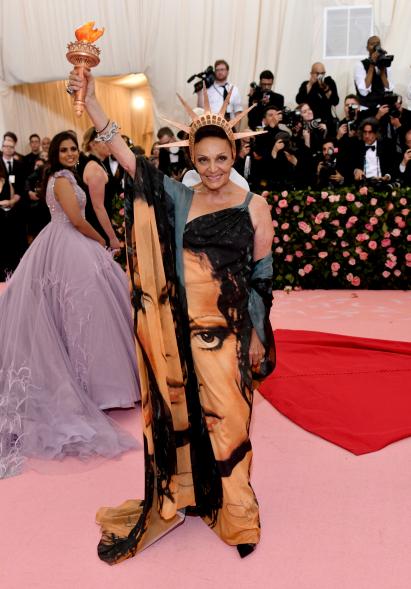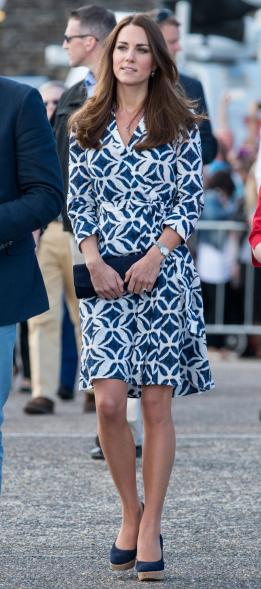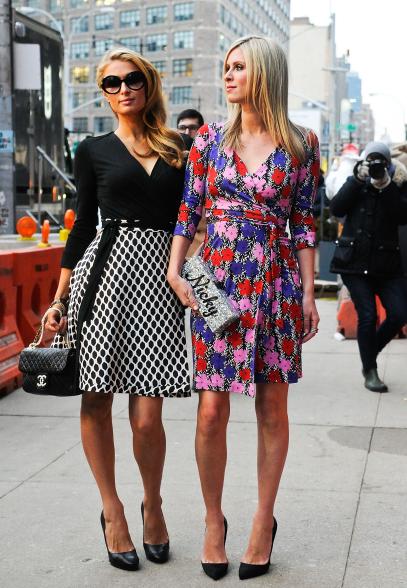Versatile, comfortable, effortless — all wrapped up in one dress.
Half a century ago, unbeknownst to her, Diane von Fürstenberg would create an iconic garment that would cement her as a household name for decades to come: the wrap dress.
Celebrating 50 years since its inception, the Belgian designer was only 27 when she created the frock that would quickly become a fashion artifact, worn by the likes of former first lady Michelle Obama, pop sensation Madonna and the late singer Amy Winehouse.
“I don’t think it has happened to a dress before,” she told Elle.
“And even more remarkable than that is if you go to any store, anywhere in the world, you will find some that may have had two or three generations of wearers, which is a sign of sustainability and timelessness.”
To honor the dress, von Fürstenberg is dedicating 2024 to celebrating the past, she tells Elle, and has launched an anniversary capsule collection called Wrap50, following the release of “Woman Before Fashion,” published by Rizzoli, which details von Fürstenberg’s expansive career.
Ironically, the designer — who admitted she once “resented” her attachment to the wrap dress — rarely wore her own design, saying it’s because she didn’t “have a waist,” she told Refinery29.
“People say I invented the wrap dress, but, if I’m honest, the dress created me,” she told Vogue. “Because of it, I became confident and independent – it gave me the opportunity to be the woman I wanted to be, and I want to share that confidence with other women.”
At just 27, the famed designer was churning out 25,000 wrap dresses in a single week and sold a million units in just two years since its launch, her success earning her a Newsweek cover.
But even von Fürstenberg, now 77, can’t articulate exactly why the figure-hugging frock initially skyrocketed to popularity, nor why it remains a wardrobe staple.
“That dress has sold for 50 years, all the time. I cannot explain it,” she told Elle.
Since the garment’s humble beginnings in 1974, it has gone through many iterations — it started as a top inspired by dancers’ uniforms, then was crafted into an everyday frock fit for running errands or going to the office and, eventually, the silhouette made its way onto red carpets as a glittering, floor-length number.
The secret to its success, von Fürstenberg muses, might be in the fabric: “They’re light. They have movement.”
“For me, the beauty of a woman is three things: eye contact, smile, and body language,” she continued. “The wrap dress completely, totally molds you and gives you a body language that happens without you even realizing it.”
The eponymous wrap dress has a certain je ne sais quoi in its generous, yet flattering silhouette that fits just about everyone — not to mention the ease of throwing it on before heading out the door.
“You wear the dress, it’s not the dress that wears you,” said von Fürstenberg, who dished that the actress Anne Hathaway was even conceived in the tulip print wrap dress.
“Somebody once said something very funny, which I think illustrates it: ‘It’s the dress that you can get a man in, and his mother doesn’t mind.’”
In other words, the dress exudes confidence and power — traits valued by von Fürstenberg, a self-proclaimed feminist and trailblazer in her own right. The acclaimed designer earned the Lifetime Achievement award from the Council of Fashion Designers of America in 2005, becoming the president of the association and, later, a chairwoman.
While she became a “woman in charge” through the creation of her iconic garment, she also bestowed that title onto the wearers of the wrap dress.
“I have no problem thinking that my dresses are uniforms for the women in charge,” she said. “And I’m perfectly happy making uniforms.”

















